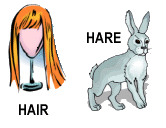I personally believe we developed language because of our deep inner need to complain. ~Jane Wagner
 I spent nearly half a day yesterday studying the differences of homonyms and homophones. Why, you may ask. Well, I am homeschooling my daughter and it seems that the term homophone is more used in the curriculum books I have than the term homonym is and, frankly, I was not taught anything but homonyms when I went to school. It was not until I began looking at all the choices of spelling curricula, that I ever ran across the term homophone and it did not stop there. Oh, no! I also ran into other terms I had never been taught in public school.
I spent nearly half a day yesterday studying the differences of homonyms and homophones. Why, you may ask. Well, I am homeschooling my daughter and it seems that the term homophone is more used in the curriculum books I have than the term homonym is and, frankly, I was not taught anything but homonyms when I went to school. It was not until I began looking at all the choices of spelling curricula, that I ever ran across the term homophone and it did not stop there. Oh, no! I also ran into other terms I had never been taught in public school.Homophones literally mean "same sound," so words having the same pronunciation but have different spelling and meaning are homophones. Such words like:
cell and sell
meat, meat, and mete
one and won
That is all well and good, but I was taught this defined homonyms, so naturally I went on to find the difference between a homophone and homonym. Now I understand the confusion--well, not really, but here is the problem: Even scholars and dictionaries do not agree what constitutes a homonym.
There is agreement that homonyms literally mean "same name" for different meanings, but opinions differ on if "same name" means same spelling and same pronunciation, or same spelling or same pronunciation. (Isn't it amazing how the difference in such little conjunctions can change the entire meaning?)
The first definition would be limited to words that are homophones and homographs--oops, I jumped ahead! What I mean is that they would be the same spelling and the same pronunciation but having different meanings:
bat - a winged mammal
bat - a wooden stick used in baseball
cap - head covering
cap - a set upper limit
However, there is that second definition that basically states that any word with a different meaning but either a same spelling or pronunciation or both is a homonym. That includes the words in the first definition plus words that are homophones and words that are spelled the same but different pronunciations:
dove - bird
dove - past tense of dive
lead - to be ahead
lead - a metal
Actually, these words are homographs, which means literally "same writing." They are words which are spelled the same as each other but differ in meaning, origin, and sometimes pronunciation.
So, here is my dilemma: Is a homonym a word that is both a homophone and a homograph, OR is it a homophone or a homograph?
Then to add to my confusion, I came across heteronyms, polysemes, and capitonyms! At this point I cannot help but think no wonder they just taught us one term in school because some words can be under several classifications.
Heteronyms literally mean "different name" so they are a specific type of homographs with different pronunciations associated with different names.
bow of a ship
a bow and arrow
a bow - bending the body
Polysemes are a bit easier to understand but a bit more difficult to identify. They are words which are spelled the same and sound the same, but have different meanings that are related.
bank - keep secure
bank - place where things are kept
mole - a small burrowing mammal
mole - someone who burrows for information hoping to go undetected
Capitonyms are words that change their meanings and sometimes pronunciation when capitalized and probably the easiest of all to identify.
job - task
Job - a book in the Bible
may - to be allowed
May - month
Let's go back to my dilemma, shall we? I am homeschooling the Princess, which means I need to pick one definition for a homonym and stay consistent, which is not easy with all these inconsistencies. I am inclined to go with a homonym is a word that is both a homophone and a homograph, as that seems to be the prevailing trend in higher education. So, now I need to unlearn what I learned to teach what should be taught.
It's kind of ironic, in a way, that I was taught homophones as homonyms by certified public school teachers and that is acceptable in our society, but that I am not certified to teach makes people concerned about whether or not I should be homeschooling my own child.
~ My Lord, with so many things to learn, there are also so many opportunities to teach things both incorrectly and more correctly than I was taught. Thank you for guiding me in what I teach my daughter. ~